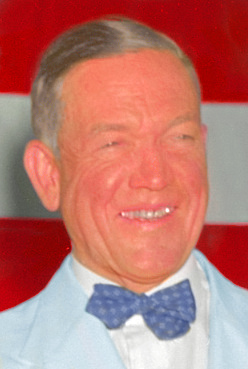Death takes U.S. Senator Charles McNary
Republican leader, Willkie running mate, ill since fall
By Lyle C. Wilson, United Press staff writer
Senator McNary
Washington –
When the Senate again meets next Tuesday, it will adjourn immediately in respect to one of its most distinguished members, Senator Charles L. McNary or Oregon, Wendell Willkie’s vice-presidential running mate in 1940 and long a Republican leader, who died yesterday in Fort Lauderdale, Florida.
Senator McNary, who would have been 70 years old June 12, had been recuperating from a brain operation performed here last November, and appeared to be recovering rapidly until he suffered a relapse two weeks ago. He had been in a coma a few days preceding his death.
Mrs. McNary, the former Cornelia Morton of Washington, and their eight-year-old adopted daughter Charlotte, who were with the Senator when he died, planned to accompany the body tonight to Salem, Oregon, their home and the Senator’s birthplace in 1874. A Senate delegation and Mrs. McNary’s sister, Miss Mary Louise Morton, will complete the party.
Mrs. McNary indicated the funeral will probably be held Friday.
Senator McNary, a first-class politician of statesmanlike proportions, participated positively in shaping the legislation of the past 24 years. He knew Senate rules and made full use of them to snare the opposition. He rarely made what is known as a speech, it being recalled that he delivered only one from 1932 through 1936.
He was a shade or more too liberal for some of his Republican colleagues, but they generally acknowledged him as the shrewdest of their company – even when he was voting with the New Deal, which he did nine of 16 times from 1933 to 1935.
The Senate’s first opportunity to honor Senator McNary will be when it reconvenes Tuesday, after a recess ordered to permit all hands to rest and ponder the circumstances surround the overriding of President Roosevelt’s tax bill veto.
The immediate adjournment will not be mere formal procedure, nor will there be light Congressional hearts aboard the McNary funeral train. Of the men who have served in the Senate since World War I, Mr. McNary probably was the best liked. Certainly, no one was more respected by his colleagues.
Reared in Oregon and one-time associate justice of his state’s Supreme Court, Mr. McNary came to the Senate in 1918 by appointment to fill an unexpired term. He never lost an election since.
Close to Presidents
Although the law and politics absorbed most of his time, he was a farmer by preference and spent his free time on his Salem acres. His interests led him to the chairmanship of the Senate Agriculture Committee and in that capacity, he was co-sponsor of the McNary-Haugen agricultural act.
Throughout most of his Senate career, Mr. McNary was in increasingly close touch with the White House, especially through the Coolidge and Hoover administrations.
President Roosevelt knew Senator McNary’s influence and conferred with him frequently in the early formative period of the New Deal. Senator McNary, in turn, not infrequently supported administration legislation, including the National Labor Relations Act, Tennessee Valley Authority and Social Security proposals. Senator McNary worked closely with the President to obtain vast waterpower developments in the Northwest, notably the Grand Coulee and Bonneville dams.
Senate post his preference
He was nominated for Vice President in 1940 to run with Mr. Willkie, an assignment he accepted reluctantly. To those enthusiasts who occasionally would tell him he should be nominated for President instead, Senator McNary replied that the idea was ridiculous. He had the only job he really wanted right in the U.S. Senate.
Meanwhile, Senate Republicans were not expected to elect a new leader to replace Mr. McNary for at least several weeks. His minority leadership responsibilities in the Senate had been cared for by his assistant, Senator Wallace H. White Jr. (R-ME), for several months.
Senators White, Arthur H. Vandenberg (R-MI) and Robert A. Taft (R-OH) have been most prominently mentioned as possible successors of Senator McNary.
Willkie eulogizes ex-running mate
New York (UP) –
Wendell L. Willkie today described the death of Senator Charles L. McNary, as a tragedy which had “taken a man whose ability was never more needed than at present.”
Mr. Willkie said:
Senator McNary had a long and distinguished career. His contributions during the last 25 years in the Senate were many and varied. He had an unusual ability to reconcile conflicting forces, and never was such ability so much needed as in the present crisis. Out of our close association in the campaign of 1940 had developed a deep personal affection.
